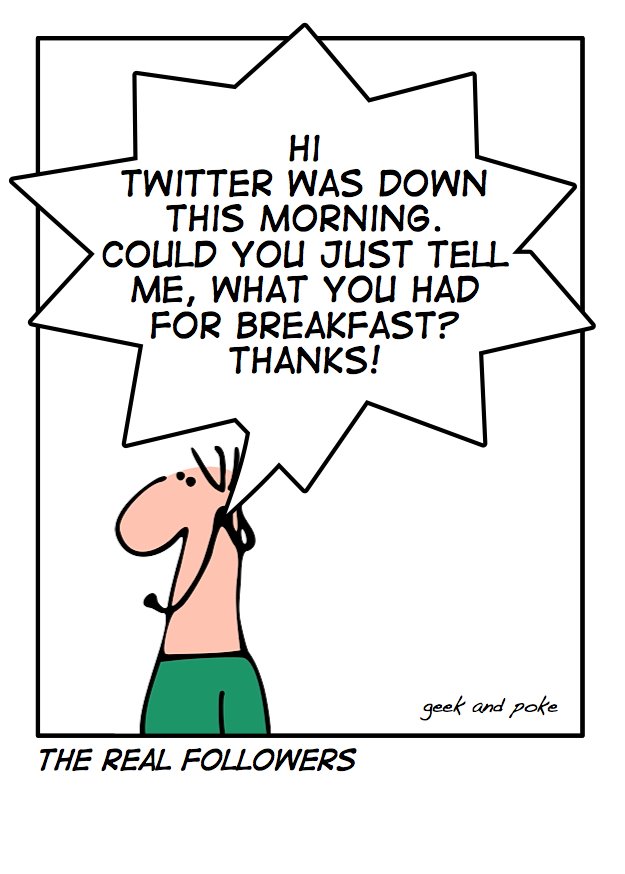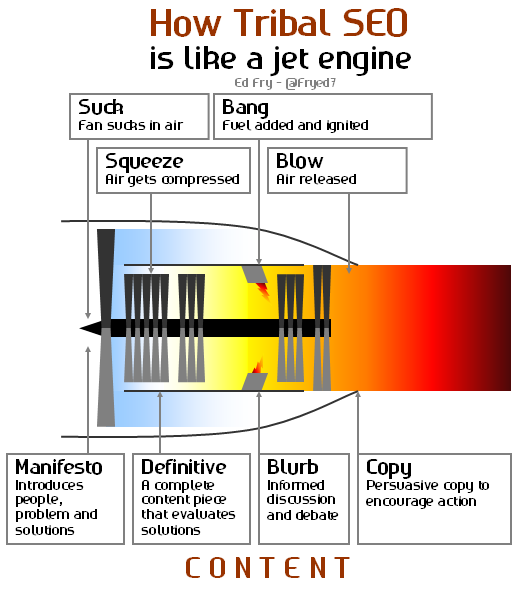SEOmoz Daily SEO Blog |
| The Definitive Guide to Awesome Web Content Posted: 21 Oct 2010 05:39 AM PDT Posted by Fryed7 This post was originally in YOUmoz, and was promoted to the main blog because it provides great value and interest to our community. The author's views are entirely his or her own and may not reflect the views of SEOmoz, Inc. What is it we SEOs do? Most of our answers probably boil down to this; we help webpages rank higher at search engines by improving each of the three cornerstones of SEO. The first aspect; technical problems - like indexable content, meta robots tags and URL structures - has been cracked by SEOmoz’s awesome web app. Suddenly we can get a complete dashboard of errors to go and sort - easy. Then of course, then there’s the “trust” issue. Getting authoritative and relevant links; and with Open Site Explorer where advanced link analysis and data is now only a click away. And with the a huge range of link building tips, strategies, and tactics here, it’s fair to say that we’ve got the SEO ninja skills to go and create “trust-worthy” websites.
So that leaves content… What's the point in what you read? We consume content to solve problems, be entertained and to satisfy curiosity. Based on where you are in a decision making process, you can divide ‘content’ into four different categories. This post is all about defining each category. In an age of tweetdeck, rss, five sentence emails and the internet making us stupid, supposedly, who on earth is hanging around to read meaningful stuff? I mean, it’s a bit over-rated when you’ve got to be checking your inbox every five minutes, keeping current with Twitter, and all these feeds, and then some...
The reason such technology exists is so we can be on the edge of stuff. We can see and read the latest ideas, news and commentary. We can connect with people who share common interests and start a conversation. That kind of ‘content’ is a) meaningless to those who aren’t in the know and b) not particularly relevant a week or so down the line. Blurb Content is conversation. It’s two way. Blurb is exclusive in that it’s meaningless to those who don’t understand the community, who don’t know the secret handshake and who aren’t clued up on the topic - but for those who are “in the know”, blurb is where discussion, debates and drama define opinions and leads to decision making. Within the club, blurb is awesome. Equally, there’s pretty useless blurb. “Great post” “really enjoyed it” or “tldr” which has no real value to other visitors, and therefore no real value to search engines either. The real power of blurb and UGC is things like this (YOUmoz), Threadless and - dare I say it? - Wikipedia. People have been empowered to go and create their own awesome corner of the web. The Rule of Blurb - Culture Valuable two-way Conversation. Conversation is the fuel of the web; and with hundreds of millions of us online, that’s the potential for a big conversation. The problem we face, both as SEOs and marketers in general is initiating that conversation. Who’s Gonna Break the Ice? IMAGE: UrologyOnline
We can do this two ways:
 1) Create content and ask for conversation (tweet this, leave a comment, let’s connect on facebook) 2) Create a system where you encourage other people to initiate conversation Which way do you think is harder to replicate, will be more scaleable and have more influence across the web in the long term? You said two, right? The question is - how. Let’s go back to the SEOmoz model (because most of us have had a good look around this site and know it well, so it’s doubly relevant): The reason why is because at some point in your SEO education, you’ve stumbled across someone or something with “the answers”. Something that answers your questions fully. Where somebody has simply communicated the concepts behind SEO to you in one or more pieces of content.
The fundamental difference is it’s a one-way conversation. Consider this scenario; your lost in an foreign city - you were supposed to be in an office meeting fifteen minutes ago. What do you do? You ask a local. They tell you how to get there. You listen and do what they say. They’re the expert, so you listen. This brings up three things: 3) Blurb is frustrating for learners becuase it isn’t definitive This doesn’t work for three main reasons:
And what’s sad, is that after the first few days after the post is published, the traffic will drop down to a mere fraction of what it was, since your readership has simply “been there, done that”. Congratulations; you’re now in a business where your ‘product’ becomes worthless practically overnight. Blogging is about the person, not the problem. Blogging has it’s place creating blurb content, not definitive content (when you confuse the two, you have a personal problem). In fact, blogging could be considered a response to definitive content; it’s the ultimate example of user-generated content, or rather... user-generated conversation. The early days of SEOmoz saw Rand posting his commentary to SEO news. Everyone’s blogging like sheep, churning out loads of mediocre content. The world doesn’t need more content. It needs more remarkable, definitive content. Suddenly, those creating Definitive Content become somebody. Blogging has it’s place in it’s roots; a platform for commentary on news, personal affairs and creating conversation - not being manipulated out of place creating definitive pieces. (There was a really interesting article about the Death of the Boring Blog Post which essentially outlines this problem from a design perspective. Apparently the answer is 'blogazines' - but this doesn't solve the fundamental problem of answering the problem people are typing in. Pretty is impressive but doesn't necessarily mean it's the best.) Definitive content is the stuff which you reference, re-read, remember and in some cases - recite! Ever been in a position where you’ve been telling someone about an awesome book, or video that you’ve gotten a bit obsessed with? And what’s interesting, is even if it isn’t necessarily “current” or trending on Twitter, you’ll still reference it ‘cause it’s awesome. Hence, Definitive Content is evergreen - which means in the long run it’s a high effort-reward strategy. Definitive Content Strategy Step 1) Find an in-demand niche within a niche. In emerging industries, rarely have people launched with awesome definitive content. Instead, as the industry matures and begins to fragment - then the niche players can identify and distinguish themselves. A great example is looking at the search marketing industry:
All three of these people followed these two principles and suddenly you’ve got four excellent examples where ‘content is king’. No one’s anointed these people as experts - instead they’ve written their way to the top and they were first to do it. It pre-sells your Definitive Content. Think about the weight of links in this context; the origin of your inbound links will contain content of some sort (at least to provide value to a visitor) - that content is Manifesto Content. It's kinda like a CV for the Definitive Content, and the better the Manifesto Content, the better your first impression - and first impressions count. IMAGE: CartoonStock.com
As I said at the beginning, content is abstract, hence the philosophical-esque questions! However, this thinking is essential if you’re to come up with your own Manifesto Content marketing strategy. Here’s a handful articles on getting your Manifesto Content shared:
The size, strength and distribution of your manifesto content will determine the overall strength of your web content, and of course good SEO practices of ensuring it gets indexed, it targets specific problem keywords and is “technically tidy” to ensure your Manifesto Content gets targeted traffic and click-throughs. Great. Now Show Me the Money. Now, you’ve been introduced as a credible source of information, you’ve educated them and cultured conversation-making abilities so they can engage in blurb. They’re now in an informed discussion about their problem, and likely, your solution if you target your blurb correctly - and all the while, you’ve been earning trust and credibility as someone who know’s what they’re talking about... Roundup That’s rather a lot to take in; so a quick roundup. The best way to illustrate how content strategy works is by comparing it to a jet engine.
What I like particularly about this analogy, is that the actual physics matches the real life SEO analogy:
What this also helps explain is why guerilla-content SEO is so much better than ‘traditional’ advertising which is more like a rocket. Create a reaction of advertising bucks and “targeted” prospects and point it in some direction is complicated (it’s rocket science) and not sustainable without continued effort. (If you haven’t come across Seth Godin before, you’re in for a treat Everyone who I’ve worked with who I’ve asked to watch this video has viewed it all the way through said it was awesome. Net result? We’ve both gotten more done. Finished the video? This is what I see SEO as - getting in the problem solving business... and not just solving your problems. “I’m not ranking number 1 - I’ll go and build some links”. Put that in context on Tribal SEO. “I’m not ranking number 1 - I’ll go and promote manifesto content”. Creating a tribe will drive your content. Tribes need to connect via blogs, online communities, social networks - in any case you need to be at the helm and leading. We have the responsibility to create awesomeness.
You’ve heard the ‘Voice of Google’, Matt Cutts, bangs on and on about creating content for visitors vs. creating content for search engines. He’s absolutely right - if you’re trying to make crummy content and webpages rank, just like trying to sell crummy products and services, then shame on you! I’m gonna end with a couple of questions and an apology. I've broken one of the cardinal unwritten rules of blogging (keep it short, stupid!) and you've probably spent waaaay too much time reading and watching all this. Whoops... But then again, does Defintive Content need a cap on the length. Shouldn't it be as long as it needs to be? Which begs the question, how would you classify this post based on the scale I’ve talked about?
Secondly, how do you see this Manifesto > Definitive > Blurb > Copy content cycle fit in with this Whiteboard Friday concept of ‘The Path to Conversion’ and your business? |
| Are Exact Match Domains Too Powerful? Is Their Time Limited? Posted: 20 Oct 2010 02:26 PM PDT Posted by randfish Last night at the SEOmoz meetup in Avi Wilensky's incredible office space, a frequent topic of discussion both during the presentations/Q+A and in small group networking before and after was the propensity for Google (and Bing) to bias towards exact match domains in the rankings. How big an issue is exact-match domains? Let's look at some data from our correlation analysis from SMX Advanced earlier this year:
Just by itself, exact match is remarkably high in correlation to rankings. No other on-site/on-page factor we examined even came close. Granted, that's not causation, and it could be other factors influencing those impressively high rankings. Let's get a bit deeper and more granular around the issue:
Holy what?! Actually, this probably isn't very surprising to most SEOs. The second highest correlation we found of anything - links, on-page elements, URL factors, keyword usage, third-party metrics (excluding only Page Authority scores, which are specifically designed to predict Google rankings) was exact-match .com domain names. Yeah - it's powerful stuff. We can also look at the raw prominence (less interesting for determining what might help a page/site rank, but useful for this application:
That's saying that more than 1/4 and nearly 1/3 SERPs contain an exact match domain in the top 10. The only thing more prominent?
No surprise it's keyword-in-the-domain matches (but not necessarily exact). So, in the first pie chart set, we'd say that for the query "org chart" only orgchart.* type domains would count. In the second, something like myorgcharts.com, greatorgcharts.net, etc. would fit the pattern. These appear in around half of all SERPs on both engines. The question is, with search results in so many sectors becoming so overrun with obviously over-SEO'd, spammy, manipulative and sometimes, downright poor quality exact-match domains, is Google bound to take action? Blueglass' Chris Winfield argued that Google is bound to giving outsized benefit to exact match domains because of the brand intent behind so many queries. Since a search for "Alaska Airlines" or "MSN" or "NY Times" is likely to want exactly those websites in the first position, Google's overcompensating in the broader algorithm by biasing towards these exact matches. Many in the audience agreed (and I personally find this viewpoint credible, too). Interestingly, some of the more experienced, ear-to-the-ground SEO types indicated that they'd heard (or believed) that Google would soon be taking action against exact match domains. One person, who wasn't at the event, but whom I trust a great deal (and will remain anonymous) indicated they thought the next 6 months would bring about this shift. Personally, I'd welcome it as both a searcher and an SEO. I think Google's relied on exact match for far too long, and it would give them a substantive quality boost over Bing to have more subtlely in the domain matching algo. But, as always, I'm curious to hear what you think - is this really a weakness/problem? Should Google take action? Do you think they will (particularly given the poor track record of improvements like this in the past year or so)? A completely unrelated p.s. Linking to Twitter profiles (as I did at the start of the post) is curious. Notice that the URLs if you're logged into Twitter look like http://twitter.com/#!/aviw instead of http://twitter.com/aviw. Now,this could be an incredibly dumb move, but actually, both Twitter and Facebook are using Google's new AJAX crawling protocol. Not as SEO-ignorant as they look, eh? :-) |
| You are subscribed to email updates from SEOmoz Daily SEO Blog To stop receiving these emails, you may unsubscribe now. | Email delivery powered by Google |
| Google Inc., 20 West Kinzie, Chicago IL USA 60610 | |



 IMAGE via:
IMAGE via: 
 1) Definitive content cultures conversation and decision-making
1) Definitive content cultures conversation and decision-making Timing is important with creating Definitive Content - I think there are two important factors:
Timing is important with creating Definitive Content - I think there are two important factors:









Niciun comentariu:
Trimiteți un comentariu